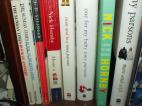READ WHAT YOU WANT TO WRITE
 "I don't read much because I don't want what I read to influence my writing."
"I don't read much because I don't want what I read to influence my writing.""I'm afraid if I read other writers in the genre I might unconsciously plagiarize."
I've heard these two statements from many, many writers (mostly unpublished), and you know what I say to this? Bullllllshit.
 If you want to write well, you need to be well read yourself (i.e., have a grasp of what sells and what your target audience likes). My grandfather had an incredible library and after his death
If you want to write well, you need to be well read yourself (i.e., have a grasp of what sells and what your target audience likes). My grandfather had an incredible library and after his death  bookshelves). But it was also a serious eye-opener for me. The reason many of his novels were so popular is that he had an insightful understanding into the minds of his readers; he knew what they wanted because he'd read so much of the material. And no one had ever accused him of plagiarism (although George Lucas was accused---for a time---of stealing some of my grandfather's ideas for his STAR WARS films).
bookshelves). But it was also a serious eye-opener for me. The reason many of his novels were so popular is that he had an insightful understanding into the minds of his readers; he knew what they wanted because he'd read so much of the material. And no one had ever accused him of plagiarism (although George Lucas was accused---for a time---of stealing some of my grandfather's ideas for his STAR WARS films).In the not-so-distant past, I'd vented my frustration to writers I know about their lack of understanding in the genre they were trying to write in. And they'd responded with one of those comments that started this post.
 So it was with great relief that I received my copy of Writer's Digest Magazine today and found an article entitled 'Read Like a Writer' by Linda Parker (pg. 44, January 2006). The gist of the article is this: "You should read a lot. A careful reader can easily pick up trade secrets from writers they love." The piece mentions how to figure plots, transitions, and character development into your own story by figuring out how the pros do it.
So it was with great relief that I received my copy of Writer's Digest Magazine today and found an article entitled 'Read Like a Writer' by Linda Parker (pg. 44, January 2006). The gist of the article is this: "You should read a lot. A careful reader can easily pick up trade secrets from writers they love." The piece mentions how to figure plots, transitions, and character development into your own story by figuring out how the pros do it.I was also pleased to see a story on Pulitzer Prize winning author Jane Smiley in this same Writer's Digest Magazine edition. And what was this article about? Well, it was about how
So when authors come to me and say those terrible lies about how they don't want other writers' works to influence their own, you know what I'll say...




1 Comments:
You are so right. I read quite a bit, but not as much as I'd like. I find my inspiration in many different writers: Melville, Bronte, Wilde, Flaubert, and more contemporary authors like Anne Rice and Frank Herbert. I say I right Science Fiction, but it's really more just drama. My library reflects the elements of my work. A lot of drama and a healthy chunk of SiFi.
I've heard of people not wanting to read other people's work out of fear of these other works colouring their own, but our work is coloured by everything around us: pop culture, politics, religion . . . Religion is a strong influence on everything I write. To create something pure is to live in a complete void. And purity is not very interesting.
One story that I am writing is influenced by D.H. Lawrence, Egyptian myth, Frank Herbert's Heretics of Dune, and the Gospels, yet it is a unique creation.
And I love allusion, so the more I read, the richer I believe all my prose (and poetry, for that matter) will be.
Post a Comment
<< Home